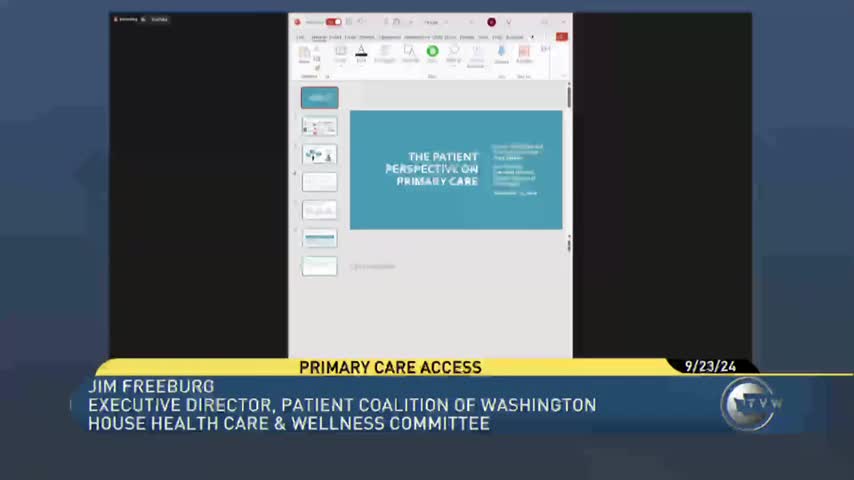Primary care crisis deepens as patient access plummets
September 23, 2024 | Health Care & Wellness, House of Representatives, Legislative Sessions, Washington
This article was created by AI summarizing key points discussed. AI makes mistakes, so for full details and context, please refer to the video of the full meeting. Please report any errors so we can fix them. Report an error »

During a recent government meeting, discussions centered on the pressing challenges facing primary care in the state, particularly from the patient perspective. A representative from a patient coalition highlighted the critical shortage of primary care providers, emphasizing that this gap significantly impacts patient care and health outcomes.
The coalition, comprising 17 local and national advocacy groups, conducted surveys among nearly 400 primary care providers and patients to assess the current landscape. Findings revealed that only 20% of providers were accepting new patients, with an average wait time of 106 days for new patient appointments. Alarmingly, some providers were scheduling appointments as far out as August 2024, underscoring the urgency of the situation.
The representative pointed out that patients face numerous barriers in accessing primary care, including limited availability of providers during evenings and weekends, high costs associated with care, and a lack of continuity due to frequent turnover among providers. A personal anecdote illustrated the frustration of patients navigating a system where their primary care provider frequently changes, leading to delays in necessary treatments and referrals.
The meeting also addressed broader workforce issues impacting primary care. A policy associate from the Health Workforce Council noted that the pandemic exacerbated existing workforce shortages, with many facilities struggling to fill vacant positions. The discussion highlighted the importance of not only increasing the number of providers but also ensuring that the healthcare system is responsive to patient needs.
The council's strategic priorities include improving data on the health workforce and developing strategies to address rural health workforce challenges. The meeting concluded with a call for innovative solutions to enhance primary care access, including the need for payment models that align with access goals and the potential use of AI tools to reduce administrative burdens on clinicians.
Overall, the meeting underscored the urgent need for systemic reforms in primary care to ensure that patients receive timely and effective healthcare services.
The coalition, comprising 17 local and national advocacy groups, conducted surveys among nearly 400 primary care providers and patients to assess the current landscape. Findings revealed that only 20% of providers were accepting new patients, with an average wait time of 106 days for new patient appointments. Alarmingly, some providers were scheduling appointments as far out as August 2024, underscoring the urgency of the situation.
The representative pointed out that patients face numerous barriers in accessing primary care, including limited availability of providers during evenings and weekends, high costs associated with care, and a lack of continuity due to frequent turnover among providers. A personal anecdote illustrated the frustration of patients navigating a system where their primary care provider frequently changes, leading to delays in necessary treatments and referrals.
The meeting also addressed broader workforce issues impacting primary care. A policy associate from the Health Workforce Council noted that the pandemic exacerbated existing workforce shortages, with many facilities struggling to fill vacant positions. The discussion highlighted the importance of not only increasing the number of providers but also ensuring that the healthcare system is responsive to patient needs.
The council's strategic priorities include improving data on the health workforce and developing strategies to address rural health workforce challenges. The meeting concluded with a call for innovative solutions to enhance primary care access, including the need for payment models that align with access goals and the potential use of AI tools to reduce administrative burdens on clinicians.
Overall, the meeting underscored the urgent need for systemic reforms in primary care to ensure that patients receive timely and effective healthcare services.
View full meeting
This article is based on a recent meeting—watch the full video and explore the complete transcript for deeper insights into the discussion.
View full meeting
